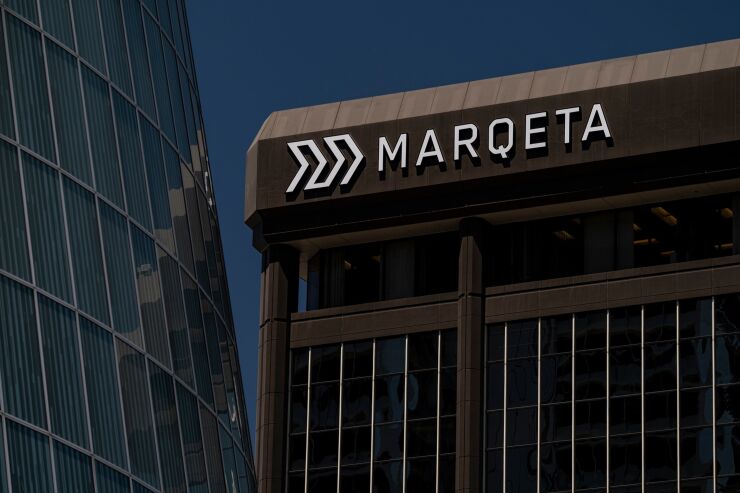
Marqeta has spent the past two years trying to diversify its revenue sources beyond major client Block and believes facilitating buy now/pay later lending will open doors to new revenue streams.
The Oakland, Calif.-based Marqeta, which specializes in selling card-issuing technology, this week began embedding BNPL options inside payment apps and digital wallets, bringing installment lending closer to the point of payment.
Marqeta is feeding its own need to build more corporate relationships. The
"Many Americans are living paycheck to paycheck, so BNPL is a great way to help them make a payment when they need it," said Lisa Hrabosky, vice president of bank and network partnerships for Marqeta. "It's an alternative to payday lending."
Called Marqeta Flex, its initial partners include Klarna and Affirm, two digital payment companies and financial services firms that lean heavily into BNPL. The first announced Flex user is Branch, a firm that sells a payment app for alternative payroll cases such as contract or gig economy workers. "We're always exploring more ways to expand Affirm's reach. The Marqeta Flex marketplace can enhance Affirm's distribution of transparent and flexible payment options," said an Affirm spokesperson in an email.
While BNPL is a rough industry for lenders, there is plenty of demand for the product, and a large addressable market for Branch and other gig economy payment companies. Forty-seven percent of consumers say BNPL enables them to make a purchase, while 60% of Gen Z and 66% of millennial consumers are likely to use BNPL, according to research from
And there are about 69 million contract workers in the U.S, according to
Marqeta is not acting as a BNPL lender but is making a distribution play. Marqeta Flex guides consumers to a BNPL option based on their credit needs and existing payment profile. Flex uses Marqeta's connections to card issuers and digital wallets as a link to BNPL lenders, reducing the need for these firms to establish individual relationships.
"This gives Affirm and Klarna a channel. We can be the catalyst, or the layer in between," Hrabosky said.
Following a
Marqeta recently
In another move, Marqeta in 2023 acquired Power Finance, a credit card program management firm. Marqeta used Power's technology to enable brands to offer cards embedded in their own websites and to customize incentive market programs.
In a research note, investment banking and asset management firm William Blair said Marqeta is "uniquely positioned to benefit from the growth in embedded finance, noting Marqeta is an early adopter of
Visa's flexible credential also makes it easier for consumers to choose a BNPL provider alongside other payment choices, Hrabosky said.
"We want to be able to support customers or businesses at different life stages and for different needs," she said.
There's an opportunity for Klarna to be a BNPL catalyst, given the propensity of lenders to accrue bulk. Klarna this week also entered a distribution partnership to extend itself to Worldpay's merchant network. Klarna in October also signed a
"For BNPL lenders, it becomes a scaling and acceptance question," said Tony DeSanctis, a senior director at Cornerstone Advisors. "If Affirm or Klarna or Afterpay are trying to get enough merchants on board, partnering with a processor can add thousands of merchants, instead of having to go out and find those merchants."
These partnerships expand the footprint of BNPL services to a wide merchant base, according to Ben Danner, a senior analyst at Javelin Strategy & Research.
"Both Klarna and Affirm have a large customer base, but I'm not sure brand loyalty matters as much in a finance product like BNPL," Danner said." Consumers that are seeking financing go with whatever brand is available, and many BNPL users have multiple BNPL vendor relationships, making them even less likely to be loyal to one particular brand.
"I see this as a race for BNPL vendors to expand their footprint as fast as possible and partnering with payment platforms and processors is key to this rapid growth."






